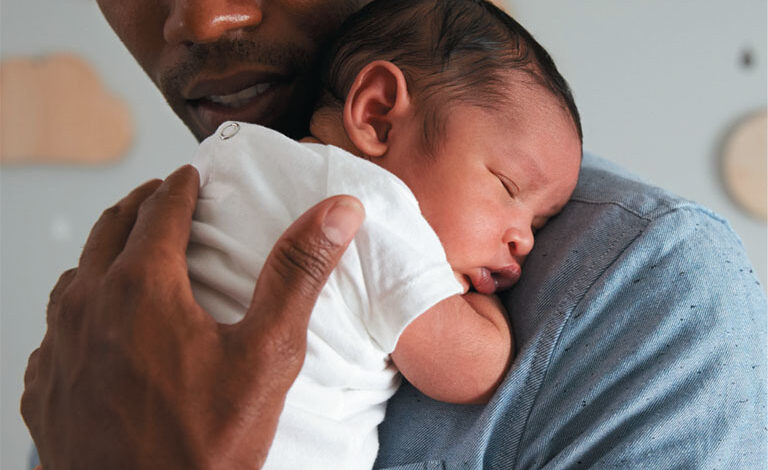
Don’t Forget Dad: Supporting Fathers in Their Health During the Postpartum Period
Becoming a parent is lifechanging for both parents. The dynamics of parenthood are evolving as social norms change. Fathers are much more likely to be involved in caring for their children than in past decades, yet support for fathers’ emotional health is far more limited than available support for mothers. Transitioning to fatherhood brings its own mental and physical health challenges. Case managers in hospitals, adult and pediatric provider offices, and the community can play a significant role in bringing attention to father-specific concerns and model unbiased inclusion of fathers in their children’s healthcare.
NEW FATHER CONCERNS
Mental health and physical well-being are real concerns for men transitioning to the role of father. A longitudinal study published by Torche and Rauf (2020) showed that weight gain and reduced reporting of their own healthcare concerns occurred during the prenatal and postpartum periods. Expectant new fathers expressed feelings of exhaustion, poor concentration and stress but were reluctant to seek support for fear that it would take away from the needs of their partner (Darwin et al., 2017). Common concern themes among new fathers have been identified (Watkins et al., 2024):
- Diminished partner relationship—lifestyle changes and relationships, exclusion from mother-baby relationship
- Multiplicity of fatherhood identification—traditional and cultural views of the father role, influence of parents and in-laws
- Forgotten entity within the perinatal experience—exclusion by healthcare team professionals, lack of education
- Masculine ideals within fatherhood—dealing with mental health concerns alone, lack of validation from other fathers
White and Jarvis (2024) identified similar themes:
- New occupational identity—changing identity with roles and responsibilities of a father, shifting priorities
- Relationship changes—changes both positive and negative, shift of partner affection
- Barriers and impacts—stress, helplessness, guilt, exhaustion
- Unmet occupational needs—lack of available education, lack of realistic expectations
Commonalities within these themes reflect the struggles of maintaining relationships with partners, adjusting to new lifestyles and establishing a new identity as a father and what that role entails.
PATERNAL PPD
In addition to the social, emotional and lifestyle changes, new fathers experience physiological changes in hormones and within the brain. These physical changes may be connected to paternal postpartum depression in some men (Storey, 2020). Studies have shown that between 2% and 25% of new fathers experience depression during the first postpartum year, generally considered to be postpartum depression or PPD (Walsh, Davis and Garfield, 2020). In the article, “Getting help as a depressed dad: A lived experience narrative of paternal postnatal depression, with considerations for healthcare practice,” published in the Journal of Psychiatric and Mental Health Nursing, Viren Swami, a psychologist, shares his own experiences related to new fatherhood and the ensuing PPD he experienced. His experiences reflect the themes identified by many fathers. He explains feeling alone and invisible during the visit with the healthcare provider, who dismissed his expression of not doing well as a joke. His need for help went unnoticed during his interaction with the healthcare provider, and it was difficult to ask for help. He states:
“… whatever I was experiencing, however bad my struggles, it was unimportant in the context of the well-being of my partner and son. I was made to feel separate to my own family or, if not quite separate, then certainly the least important component of it” (Davenport & Swami, 2022).
Investigation into paternal PPD, specific screening tools, treatments, and implications is lacking compared to maternal PPD. The American Academy of Pediatrics encourages the integration of depression screening for mothers into infant well visits at 1, 2, 4 and 6 months. However, the screening of fathers is at the provider’s discretion during the 6-month well-child visit (Walsh, Davis and Garfield, 2020). Identifying paternal PPD is key to obtaining effective treatments such as therapy and medication.
WHAT CAN THE CASE MANAGER DO?
Regardless of the setting, the case manager can support fathers in obtaining and maintaining wellness by acknowledging fatherhood’s impact on men’s health and well-being. Recognize the signs of depression, especially during the postpartum period. Encourage providers to assess both parents for depression. Recognize fathers in the room as part of the child/parent unit during well-child and sick visits. Model a family-centered approach. Use motivational interviewing skills to have paternal-focused conversations and listen to what new fathers are really saying. Learn more about the resources available to fathers in their community and online. New fathers seek opportunities to learn how to best care for their child and their partner, financial and family planning information, and familiarization with the healthcare and social systems (Griffith et al., 2025). Make these resources readily available to fathers.
CONCLUSION
All parents experience a lack of sleep and change in lifestyle and relationships after the birth of a baby. Along with these visible day-to-day changes, transitioning to fatherhood has emotional and physical implications that are not so easy to see. The changes that come with parenthood can be joyful, exciting, stressful and confusing. Although the struggles and emotional toll of new fatherhood do not always lead to PPD, recognition that PPD is a possibility is a must. Fathers are less likely to seek help in coping with their struggles. Case managers have the opportunity to acknowledge the changes new fathers are experiencing, provide education opportunities and support depression screening for fathers as well as mothers.
REFERENCES
Darwin, Z., Galdas, P., Hinchliff, S., Littlewood, E., McMillan, D., McGowan, L., Gilbody, S., & Born and Bred in Yorkshire (BaBY) team (2017). Fathers’ views and experiences of their own mental health during pregnancy and the first postnatal year: a qualitative interview study of men participating in the UK Born and Bred in Yorkshire (BaBY) cohort. BMC pregnancy and childbirth, 17(1), 45. https://doi.org/10.1186/s12884-017-1229-4
Davenport, C. J., & Swami, V. (2023). Getting help as a depressed dad: A lived experience narrative of paternal postnatal depression, with considerations for healthcare practice. Journal of psychiatric and mental health nursing, 30(1), 1–7. https://doi.org/10.1111/jpm.12854
Griffith, D. M., Jaeger, E. C., Pepperman, P., Chustz, K. A., Frazier, D., & Wilson, A. (2025). Expectant and new fathers say they need resources and sources of support. BMC pregnancy and childbirth, 25(1), 205. https://doi.org/10.1186/s12884-025-07290-z
Storey, A. E., Alloway, H., & Walsh, C. J. (2020). Dads: Progress in understanding the neuroendocrine basis of human fathering behavior. Hormones and behavior, 119, 104660. https://doi.org/10.1016/j.yhbeh.2019.104660
Torche, F. and Rauf, T. (2021). The Transition to Fatherhood and the Health of Men. J. Marriage Fam, 83: 446-465. https://doi.org/10.1111/jomf.12732
Walsh, T. B., Davis, R. N., & Garfield, C. (2020). A Call to Action: Screening Fathers for Perinatal Depression. Pediatrics, 145(1), e20191193. https://doi.org/10.1542/peds.2019-1193
Watkins, A. E., El Zerbi, C., McGovern, R., & Rankin, J. (2024). Exploration of fathers’ mental health and wellbeing concerns during the transition to fatherhood, and paternal perinatal support: scoping review. BMJ open, 14(11), e078386. https://doi.org/10.1136/bmjopen-2023-078386
White, C., & Jarvis, K. (2024). Men’s experiences of the transition to fatherhood during the first postnatal year: A qualitative systematic review. The British journal of occupational therapy, 87(11), 661–672. https://doi.org/10.1177/03080226241258577
, BA, MSN, RN, CCM, has over 30 years of experience in pediatric nursing and 10 years of pediatric case management and management experience in various post-acute settings. She holds a BA in elementary and special education as well as a MSN in nursing administration.
Image credit: MONKEY BUSINESS IMAGES/SHUTTERSTOCK.COM

 Theresa M. Litzinger
Theresa M. Litzinger


